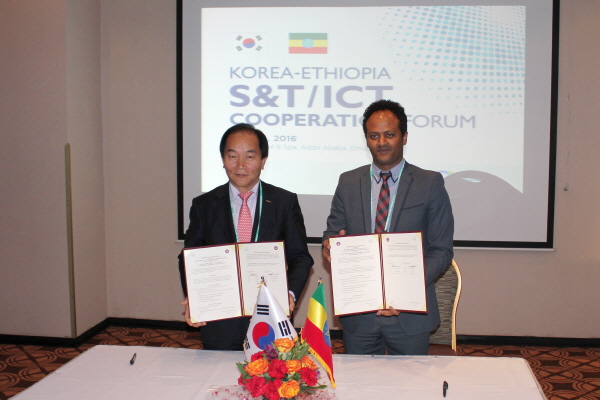KIGAM-AAiT, technical cooperation for a better quality of life
- Nameadmin
- Date2016/05/27 00:00
- Hit598
Korea Institute of Geoscience and Mineral Resources (Dr. Kyu Han Kim, the President of KIGAM) singed the MOU with Addis Ababa Institute of Technology (Dr. Esayas G. Youhannes, the Executive Director of AAiT) for the purpose of supporting the development of waste recycling technology and securing the resources at Addis Ababa, the capital city of Ethiopia.
*Addis Ababa Institute of Technology(AAiT): In 1953, it was established as a institute of Technology under the University of Addis Ababa. Since 2008, the government of Ethiopia implemented educational policies which is about accepting 70 percent of total students into the science and technology department in order to accelerate the development of scientific and technology.

In this MOU, the major concern is about the appropriate technology which supports finding the solutions for chronical problems in Africa especially about securing food and water resources and the absence of municipal solid waste recycling technologies. Both institutes will support the exchange of experts between two institutes and launching the training programmesi into Ethiopia.
Based on the world’s best Korean Carbon Capture Utilization Storage (CCUS) technology responding to the climate change, KIGAM will transfer the technology of Korean waste recycling system and also provide educational programmes to the local residents in Ethiopia.
KIGAM will transfer the recycling technology of eliminating lime water by utilizing carbon dioxide so that it can delay the global climate change which is specifically for the cinder which created from the waste incineration facilities.
A system called “carbon money” which provides the milage to local people when they donate the waste paper to the specific vending machine which collects the waste paper will be implemented in Ethiopia. Also, as a part of the duties of international cooperation, supplying eco-friendly women sanitary products and ‘Better life for girls’ educational program to local people are included in the MOU as well.
* Due to the water shortage issues in Ethiopia and the absence of the technology of securing water for living and drinkable water in the rural areas, the rural areas are having a serious problem with sanitary issues. For instance, the distribution rate for sanitary products such as in toilet has only rated to 7 percent. Furthermore, due to the cultural issues, during the menstrual cycle, some girls are not allowed to attend the school. To improve the life and sanitation in Ethiopia, women are required to take certain hours of educational program women are with the appropriate curriculums.
Both institutes are agreed on collaborating in the field of Mapping Well Potential using GIS and Remote Sensing Technology which is authorized by KIGAM. The Water Resource Treatment which save the rain water into the ground and recycle will be provided to Ethiopia in order to secure the water resources in Ethiopia. Through the MOU, a technology of the Underground Storage for Necessity Supplies which has insulating function will be promoted as well.
If the businesses of the Underground Storage for Necessity Supplies and municipal waste disposal facilities with the government of Ethiopia and the nine regional governments concluded successfully, there will be more chance for Korean technology to be stretch its influence over the market in Africa in the future. In addition to that, if a package of the global climate change appropriate technology, municipal solid waste recycling technology, and the underground storage for supplies successfully transferred and then came into effect over Africa and all other developing countries, the certified emission reductions which is the major points of Paris Agreement will be secured.
The president of KIGAM, Dr. Kyu Han Kim stated that through the expansion of Korean technology against to the global climate change, we will support the better life for people in developing countries as well as developing technology that are appropriate for the regional situation.